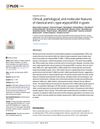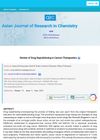 November 2023 in “Global Medical Genetics”
November 2023 in “Global Medical Genetics” Netherton syndrome can cause severe dehydration, infections, and growth issues in infants.
40 citations,
October 2012 in “Dermatologic clinics” More research is needed to understand the genetic causes of Alopecia areata to develop better treatments.
 290 citations,
December 2017 in “Journal of The American Academy of Dermatology”
290 citations,
December 2017 in “Journal of The American Academy of Dermatology” Alopecia areata is an autoimmune condition causing hair loss, influenced by genetics, stress, and diet, and may be prevented by a high soy oil diet.
 152 citations,
December 2007 in “Gender Medicine”
152 citations,
December 2007 in “Gender Medicine” Male and female skin differ due to hormones, affecting conditions like hair loss, acne, and skin cancer, and suggesting a need for gender-specific treatments.
 148 citations,
December 2018 in “Journal of autoimmunity”
148 citations,
December 2018 in “Journal of autoimmunity” Alopecia areata is an autoimmune disease causing patchy hair loss, often with other autoimmune disorders, but its exact causes are unknown.
 7 citations,
October 2013 in “British Journal of Dermatology”
7 citations,
October 2013 in “British Journal of Dermatology” HIV can cause skin disorders, which are often the first sign of infection, especially in people with darker skin.
 5 citations,
May 2018 in “PloS one”
5 citations,
May 2018 in “PloS one” Both classical and L-type atypical BSE from cattle can infect goats with different incubation times, and tests can distinguish between the two strains.
 5 citations,
November 2011 in “Expert Review of Dermatology”
5 citations,
November 2011 in “Expert Review of Dermatology” The document concludes that early diagnosis and a comprehensive treatment plan are crucial for managing hair loss in children, with a focus on both medical and psychological support.
 4 citations,
October 2022 in “Genes”
4 citations,
October 2022 in “Genes” Our microbiome may affect the development of the hair loss condition Alopecia Areata, but more research is needed to understand this relationship.
 1 citations,
January 2012 in “Elsevier eBooks”
1 citations,
January 2012 in “Elsevier eBooks” The document concludes that the skin is a complex organ providing protection, sensation, and healing, with challenges in treating conditions like itchiness.
 May 2024 in “Journal of Education, Health and Sport”
May 2024 in “Journal of Education, Health and Sport” Current treatments for folliculitis decalvans include antibiotics, isotretinoin, and potential new therapies like botulinum toxin A and PRP.
 March 2024 in “International journal of molecular sciences”
March 2024 in “International journal of molecular sciences” Zinc, copper, and iron are important for skin health and may help diagnose skin diseases.
 August 2023 in “Natural Resources for Human Health”
August 2023 in “Natural Resources for Human Health” Vegetarians should take B vitamin supplements to avoid health issues.
 June 2022 in “bioRxiv (Cold Spring Harbor Laboratory)”
June 2022 in “bioRxiv (Cold Spring Harbor Laboratory)” ILC1-like cells can cause alopecia areata by attacking hair follicles.
132 citations,
April 2005 in “Gastroenterology” A gluten-free diet significantly improves skin and health issues in people with dermatitis herpetiformis, a skin condition linked to celiac disease.
122 citations,
April 2020 in “American Journal Of Pathology” Skin aging is a complex process influenced by various factors, leading to wrinkles and sagging, and should be considered a disease due to its health impacts.
 56 citations,
March 2015 in “Journal of Investigative Dermatology”
56 citations,
March 2015 in “Journal of Investigative Dermatology” Healthy mitochondria in skin cells are essential for proper hair growth and skin cell interaction in mice.
20 citations,
March 2021 in “Drug design, development and therapy” Topical immunotherapy can treat alopecia areata, but its effectiveness varies and the exact mechanism is unclear.
42 citations,
December 2011 in “The journal of immunology/The Journal of immunology” RANKL causes lymph nodes to grow by making certain cells multiply.
20 citations,
January 2019 in “Toxicology Reports” Dunaliella salina microalgae is safe to eat and may boost health.
 August 2024 in “Asian Journal of Research in Chemistry”
August 2024 in “Asian Journal of Research in Chemistry” Repurposing existing drugs can improve cancer treatment but faces challenges.
15 citations,
January 2023 in “Antioxidants” Oxidative stress plays a significant role in alopecia areata, and new treatments may include JAK inhibitors and antioxidants.
 November 2023 in “BMC genomics”
November 2023 in “BMC genomics” The study concluded that the arachidonic acid pathway and the protein KRT79 play a role in determining the fineness of cashmere.
 2 citations,
October 2022 in “The journal of investigative dermatology/Journal of investigative dermatology”
2 citations,
October 2022 in “The journal of investigative dermatology/Journal of investigative dermatology” AIRE deficiency causes hair loss similar to alopecia areata in mice.
 September 1998 in “Journal of The European Academy of Dermatology and Venereology”
September 1998 in “Journal of The European Academy of Dermatology and Venereology” The conclusion is that proper recognition and treatment of skin conditions are crucial for the elderly due to changes in skin, nails, and hair with age, and the impact of these conditions on health and mobility.
 34 citations,
October 2017 in “Archivos Argentinos De Pediatria”
34 citations,
October 2017 in “Archivos Argentinos De Pediatria” Alopecia Areata is a complex, unpredictable autoimmune hair loss condition with limited treatment options and a significant psychological impact.
 26 citations,
June 2012 in “The Journal of Obstetrics and Gynecology of India”
26 citations,
June 2012 in “The Journal of Obstetrics and Gynecology of India” Most skin changes during pregnancy are harmless and temporary, but some can risk the fetus and need careful treatment.
 24 citations,
January 2008 in “KARGER eBooks”
24 citations,
January 2008 in “KARGER eBooks” The document concludes that ongoing research using animal models is crucial for better understanding and treating Alopecia Areata.
 23 citations,
June 2003 in “Journal of Investigative Dermatology Symposium Proceedings”
23 citations,
June 2003 in “Journal of Investigative Dermatology Symposium Proceedings” Alopecia Areata is an autoimmune disease affecting hair follicles, influenced by genetic and environmental factors, with rodent models being essential for research.
 23 citations,
July 1982 in “International Journal of Dermatology”
23 citations,
July 1982 in “International Journal of Dermatology” The review concludes that accurate diagnosis of different types of hair loss requires proper biopsy techniques and understanding the hair growth cycle and underlying causes.























